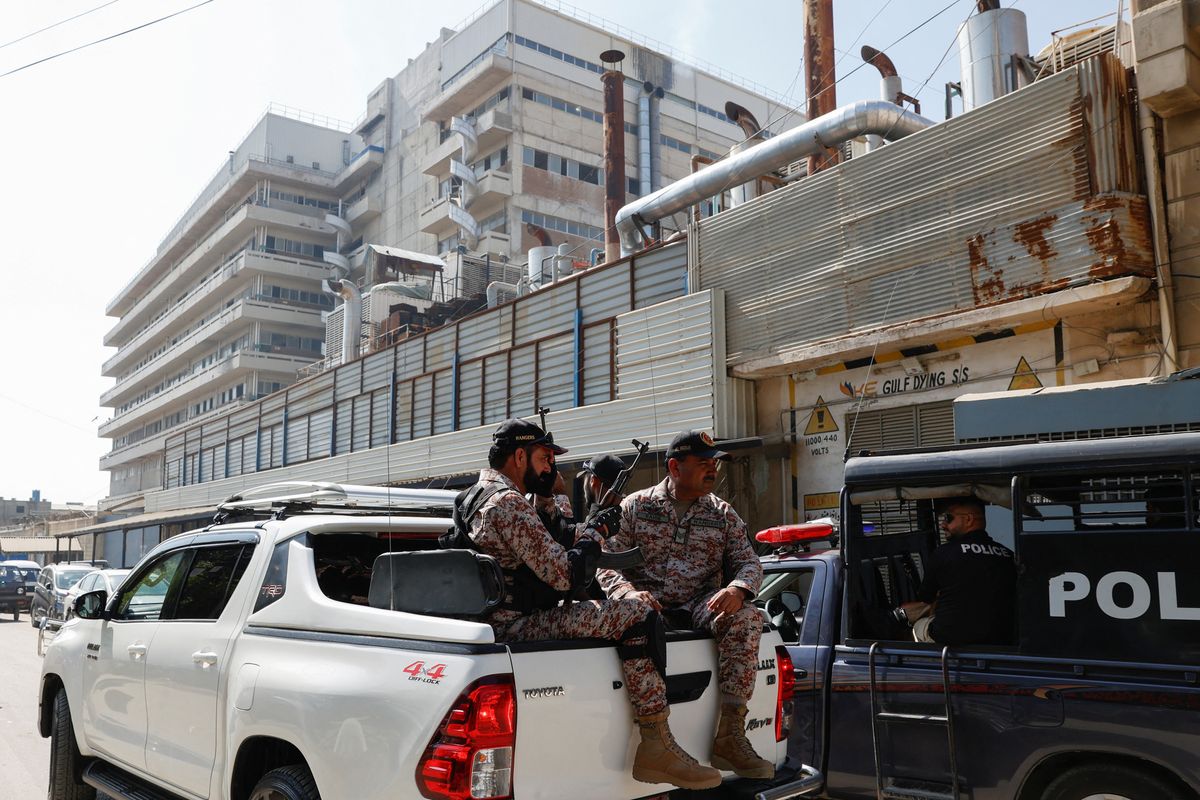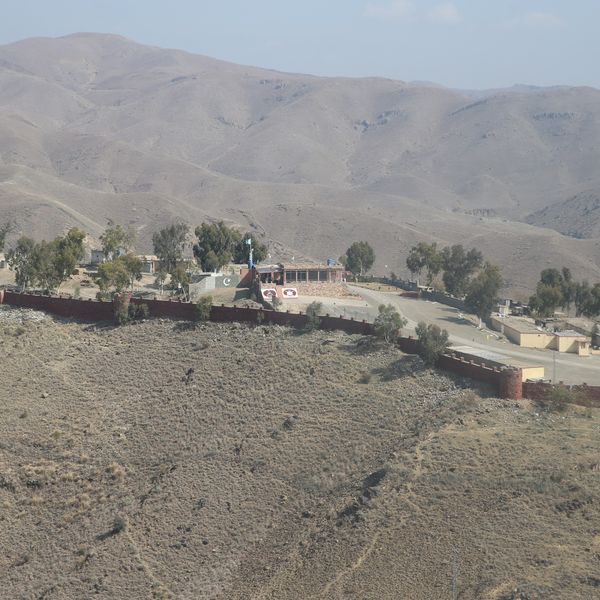The 10 times Pakistan amended its anti-terrorism law
Proposed 2024 amendment seeks broader detention powers

Javed Hussain
Correspondent
I have almost 20 years of experience in print, radio, and TV media. I started my career with "Daily Jang" after which I got the opportunity to work in FM 103, Radio Pakistan, News One, Ab Tak News, Dawn News TV, Dunya News, 92 News and regional channels Rohi TV, Apna Channel and Sach TV where I worked and gained experience in different areas of all three mediums. My journey from reporting to news anchor in these organisations was excellent. Now, I am working as a correspondent with Nukta in Islamabad, where I get the opportunity of in-depth journalism and storytelling while I am now covering parliamentary affairs, politics, and technology.

Paramilitary soldiers sit in a vehicle driving past the factory where, according to police, two Chinese nationals were shot and injured, in Karachi, Pakistan November 5, 2024.
Reuters
1997 law targeted sectarian violence
Post-9/11 changes expanded counter-terror powers
2014 APS school attack led to major reforms
Pakistan's Anti-Terrorism Act (ATA) has been amended 10 times since its inception. Its most recent and controversial update may come in 2024 with provisions that expand the governments powers of detention, which have sparked significant debate about civil liberties and security powers.
The law, first introduced in 1997 in response to rising sectarian violence in Pakistan, has evolved significantly over its 27-year history. Successive governments have expanded the powers of security forces through amendments to this law.
The ATA has been amended 10 times so far - in 1999, 2000, 2001, 2002, 2004 (twice), 2005, 2013, 2014, and 2020. In November 2024, the government presented a draft amendment in the parliament which would bring the total to 11.
First wave of terrorism in Pakistan
In the late 1990s, militant groups including Sipah-e-Sahaba Pakistan (SSP) and its offshoot Lashkar-e-Jhangvi engaged in armed conflicts and carried out major attacks on government installations in urban centers. The Act was designed to combat these acts of terrorism and control communal violence within the country.
The first two amendments (1999 and 2000) were enacted to deal with the same wave of sectarian violence and militant attacks that had prompted the original law, aiming to strengthen the ATA's capacity to combat terrorism, control communal riots, and address support for terrorism outfits.
The period between 2001 and 2005 saw another significant round of modifications to the ATA, driven by Pakistan's transformed geopolitical position after the September 11, 2001 attacks and its role as a frontline state in the War on Terror.
These amendments introduced changes to terrorism financing regulations, penalty structures, definitional frameworks, and the procedures for proscribing organizations.
The 2013 amendment specifically targeted terror financing mechanisms, introducing new provisions to monitor and control financial flows to terrorist organizations. However, these measures proved insufficient in meeting international standards for combating terror financing, contributing to Pakistan's later inclusion on the Financial Action Task Force's (FATF) grey list and the need for another amendment on this issue in 2020.
The War on Terror heightened international pressure on Pakistan for stronger counter-terrorism measures. Notably, the amendments made between 1999 and 2002 were enacted through ordinances, before the country's return to parliamentary democracy in 2002.
Post-APS amendment
Despite the legislative measures enacted so far, Pakistan continued to face severe security challenges, particularly from the Tehreek-e-Taliban-Pakistan (TTP), which emerged as a unified militant organization in 2007.
Between 2007-2014, the TTP conducted numerous attacks across the country, targeting both civilian and military installations. The group maintained strongholds in the tribal areas along the Afghan border, despite multiple military operations.
In June 2014, following multiple major terrorist attacks in Pakistan's metropolitan areas, including a deadly attack on Karachi's Jinnah International Airport, the Pakistan Army launched Operation Zarb-e-Azb in North Waziristan.
This major offensive against militant groups led to retaliatory attacks, culminating in a devastating assault on the Army Public School (APS) in Peshawar on December 16, 2014, where TTP militants killed 150 people, including more than 130 schoolchildren. This tragic event marked a turning point in Pakistan's counter-terrorism policy, prompting significant amendments to the ATA along with the introduction of the National Action Plan (NAP) to combat terrorism more comprehensively.
These amendments encompassed various aspects, including the admissibility of electronic and forensic evidence, provincial counter-terrorism strategies, witness and evidence protection protocols, anti-terrorism court reforms, mandatory daily hearings, expedited case resolution, suspect transfer procedures to law enforcement, Joint Investigation Team (JIT) formation guidelines, and the establishment of special courts.
Countering terror financing
In 2018, Donald Trump's administration lobbied the FATF to place Pakistan on its "Grey List" due to strategic deficiencies in its anti-money laundering and counter-terrorist financing framework.
This development prompted a comprehensive overhaul of Pakistan's financial crime legislation, and in 2020, the ATA underwent significant amendments specifically designed to address FATF concerns.
These amendments altered Section 11, establishing penalties for non-compliance with UN Security Council resolutions. Section 11 of the ATA has undergone the most amendments out of any other section in the Act, being amended five times in total, as this provision specifically addresses various forms of financial support and facilitation.
Oversight of financial support networks, introducing stricter controls on public and private employees providing financial assistance to terrorists or extremists, property use, tenancy arrangements, and investigative procedures were strengthened.
These legislative reforms contributed to Pakistan's successful removal from the FATF Grey List in October 2022.
The odd one out?
In 2024, Interior Minister Mohsin Naqvi introduced a controversial bill to the National Assembly proposing to resurrect amendments to Section 11 through sub-section 11 EEEE - provisions that had previously lapsed in 2016.
The bill, which was swiftly referred to committee without substantive debate, would grant security forces broad powers to detain suspects for up to three months based on "reasonable suspicion" of posing a threat to national security.
While the government cites a recent surge in terrorist activities and casualties among security personnel as justification, critics argue that the vague language of these amendments could enable their misuse against political opponents and dissidents.










Comments
See what people are discussing